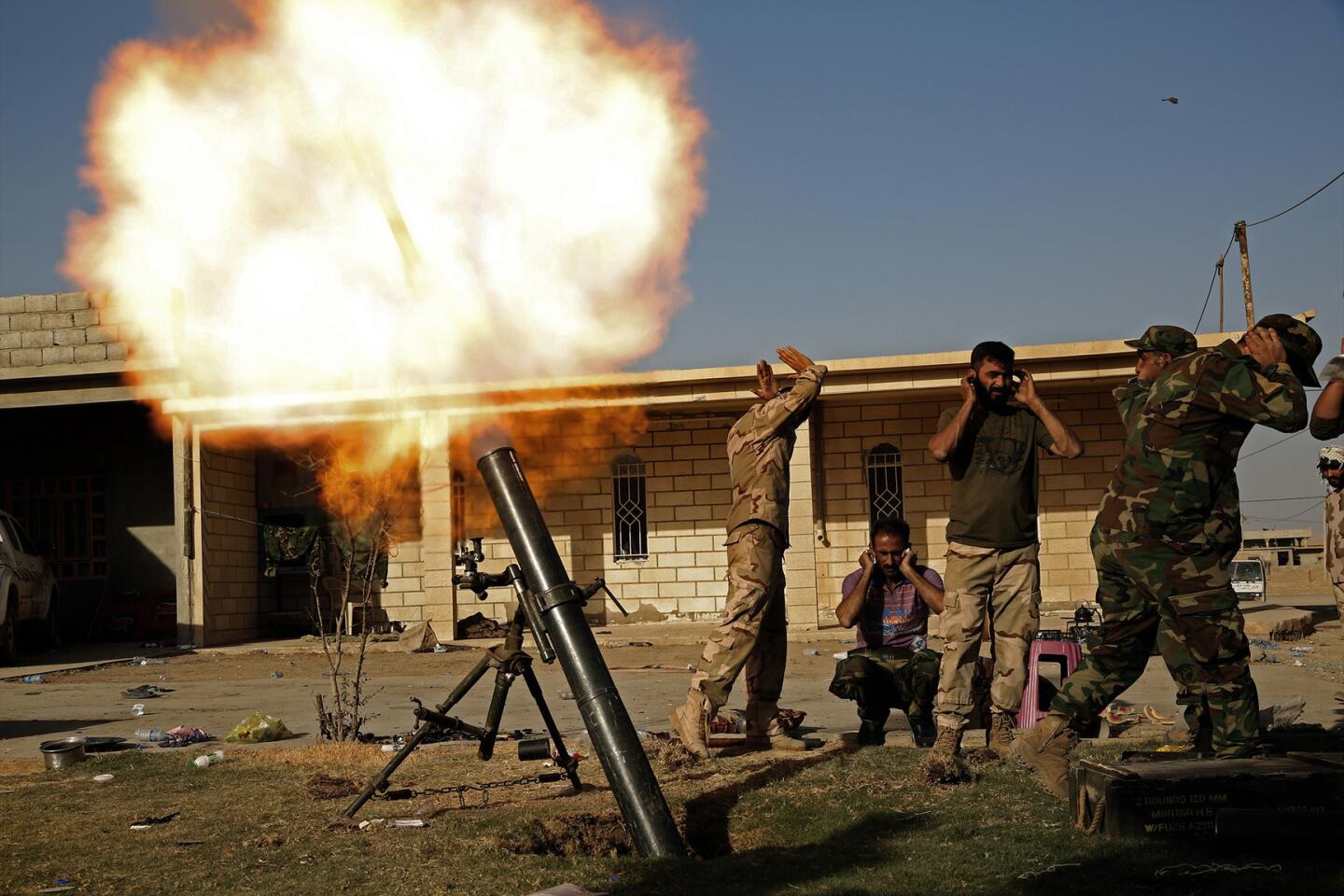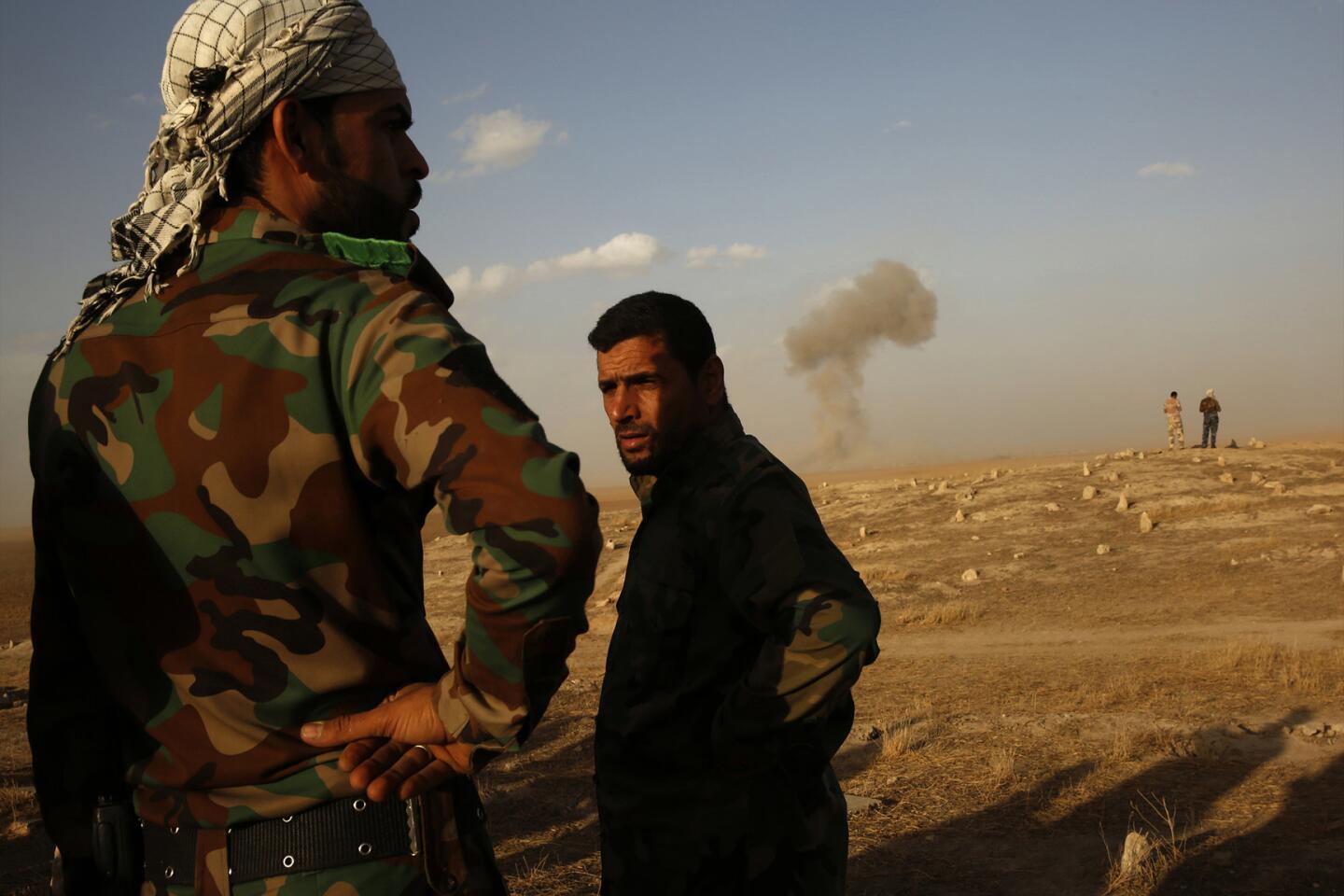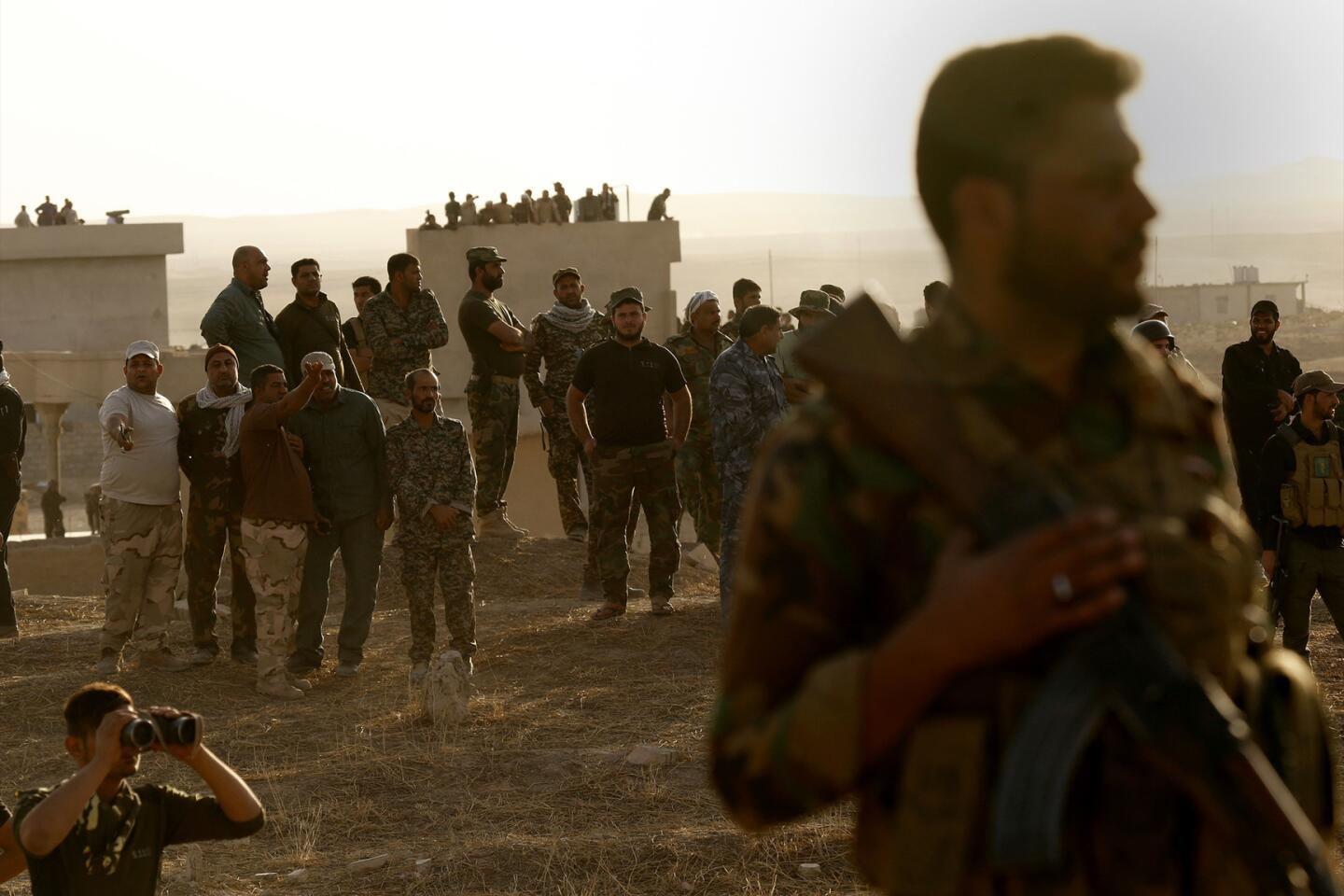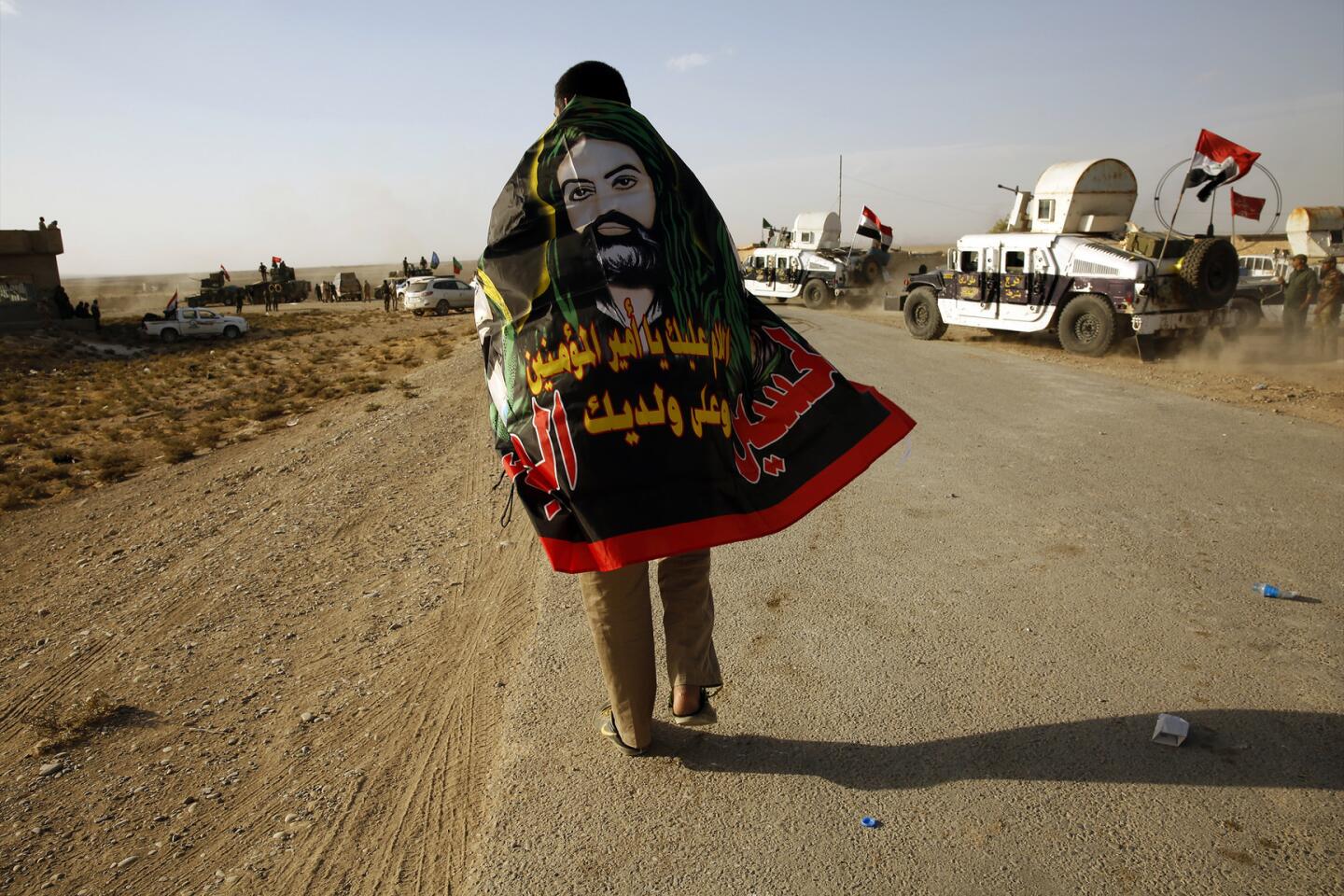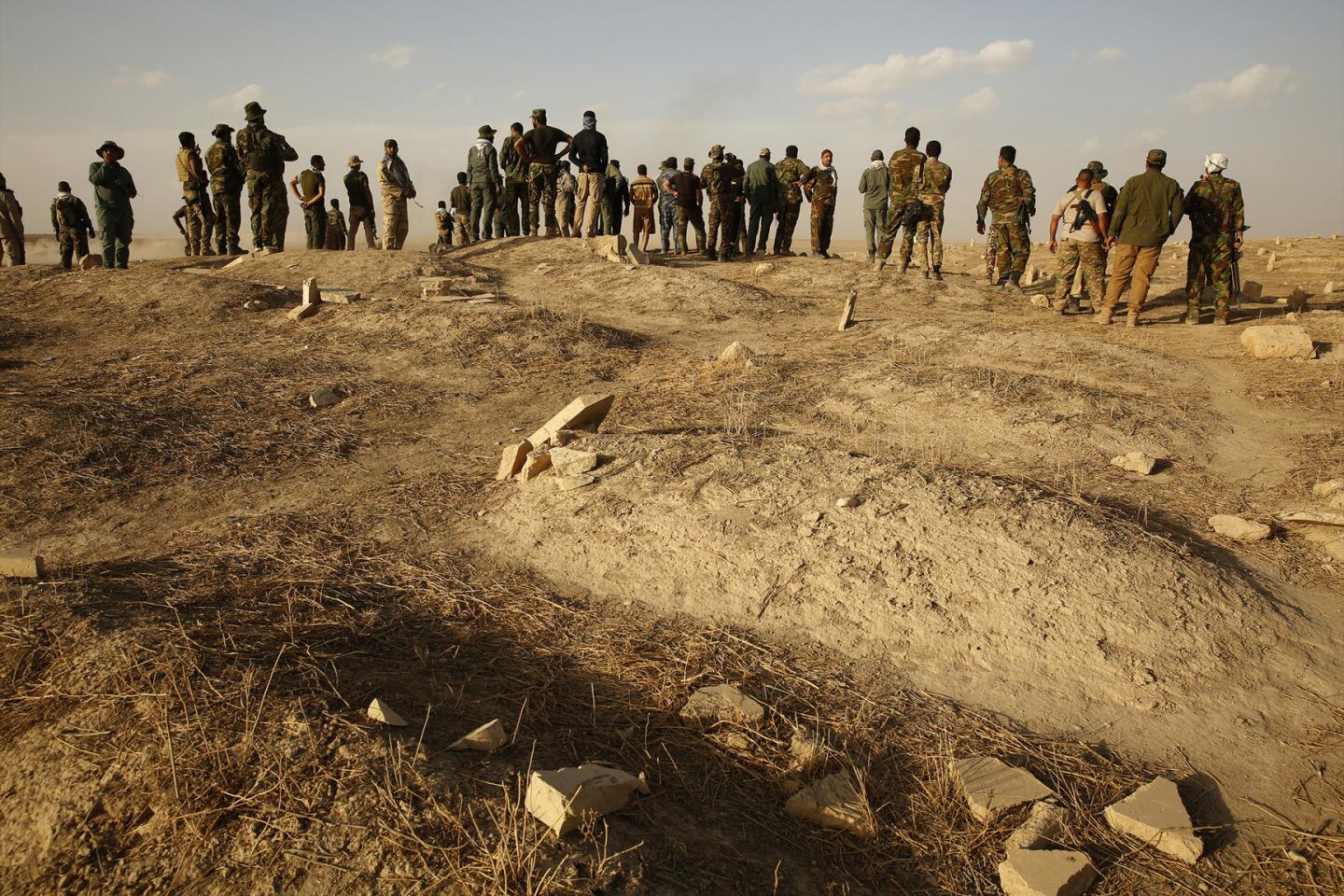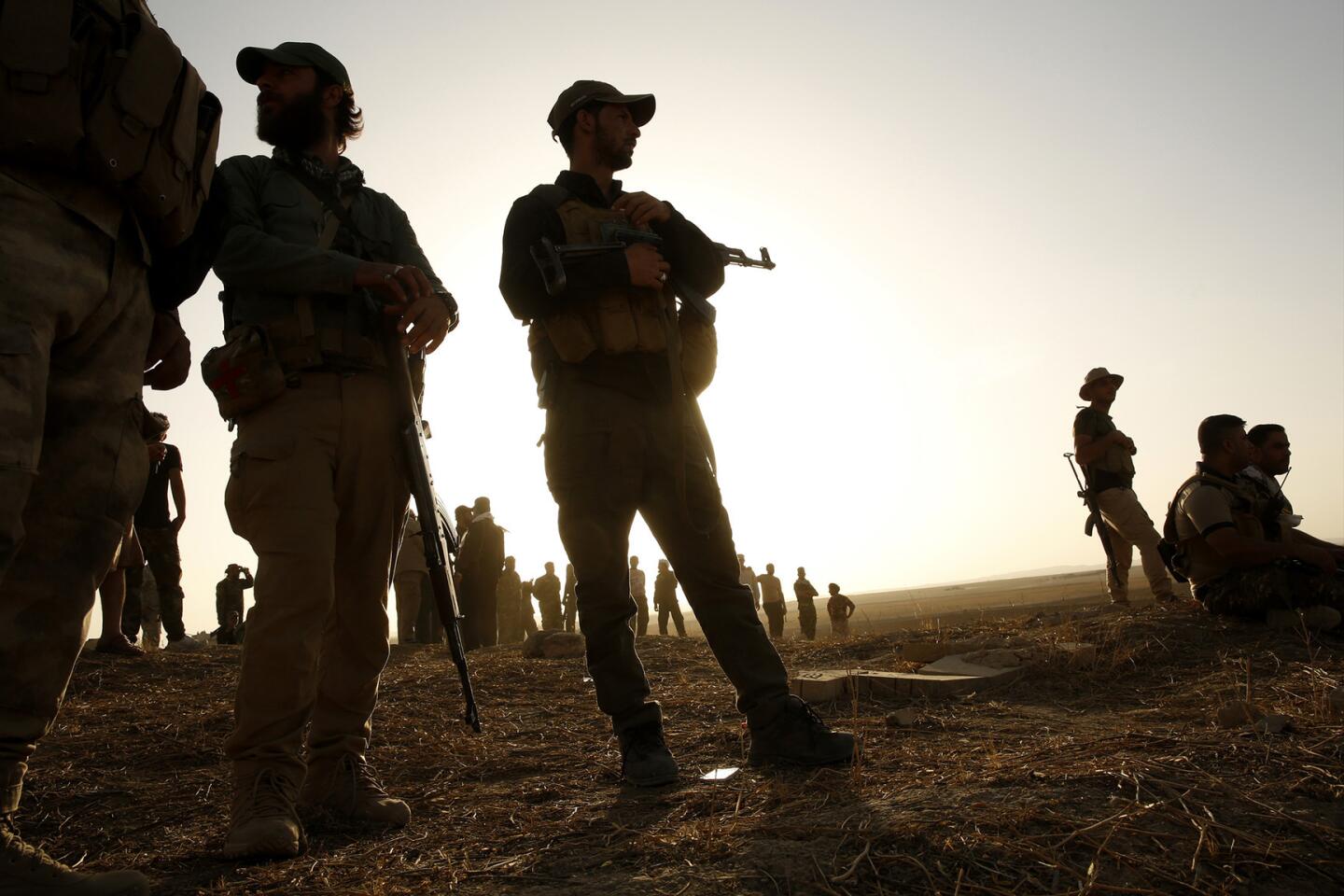Shiite militias have joined the battle to push Islamic State from Mosul. But can they be kept under control?
- Share via
Reporting from Zarqa, Iraq — As the Iraqi army has pressed its offensive to drive Islamic State militants from Mosul, a mostly Sunni Muslim city, it has been joined by a potentially troublesome ally: Shiite fighters, some of whom have been accused in the past of abuses against their Sunni compatriots.
The Shiite militias, known as popular mobilization units, received the government’s blessing to take part in the battle that could break Islamic State’s grip in Iraq, and they have promised to follow orders from Iraqi Prime Minister Haider Abadi. But their presence on the battlefield has stoked fears that they might exact revenge against Sunnis and widen Iraq’s broad sectarian divide.
If Iraqi forces succeed in ousting Islamic State from Mosul, the country’s second-largest city, it’s not clear what Abadi will do with the militias, known in Arabic as Hashd al Shaabi. Some are allied with an increasingly powerful group of Shiite politicians in parliament.
“The Iraqi government has two approaches with the Hashd: what they would like to do, and what they are forced to do,” said Michael Knights, an analyst at the Washington Institute who met with officials in northern Iraq after the offensive started last month. “There’s a very active political game of chess going on right now around Hashd mobilization.”
One fear, he said, is that Hashd al Shaabi could become a powerful, government-allied militant group along the lines of the Revolutionary Guard in Iran or Hezbollah in Lebanon.
In past offensives, the militias have been accused of committing kidnappings and executions, and overrunning and occupying areas they promised not to enter. Amnesty International issued a report last month documenting allegations of abuse and killings of Sunnis by the Shiites during the Fallujah offensive in May.
A previous report by Human Rights Watch found the militias destroyed hundreds of homes and businesses after the offensive to recapture the town of Tikrit last year.
Some of the groups’ leaders dispute those allegations, saying they fight fair, respect civilians and are doing their part to topple Islamic State, Sunni extremists who consider Shiites apostates and treat them ruthlessly.
The popular mobilization units resent being called militias, although they are not part of the regular army. They argue that they are military groups sanctioned by the government and responsible to the prime minister.
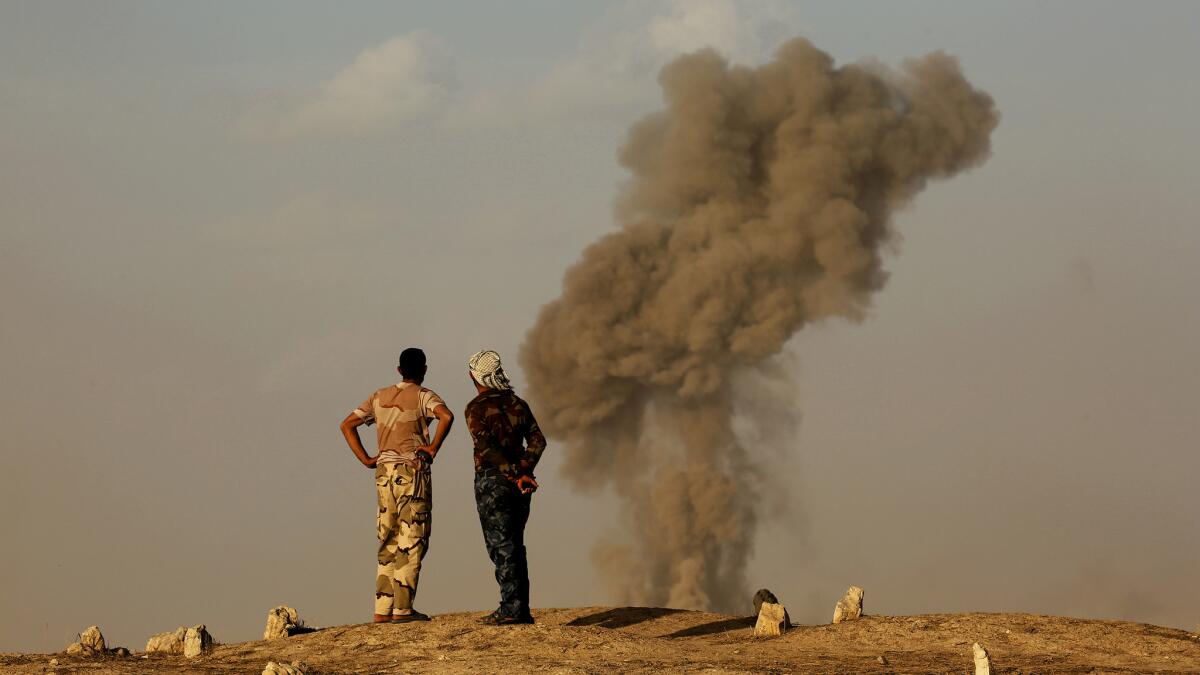
“Our mission is to liberate our country,” said Hadi Ameri, leader of the Badr Organization, the military wing of a Shiite political party he also leads in parliament.
Members of Badr flew their green and white flags along the desert road to Zarqa this week, joined by two other large militias flying their own flags. Fighters taped pictures to their trucks of Ayatollah Ali Khamenei, the spiritual leader of Iran, and Grand Ayatollah Ali Sistani, his counterpart in Iraq. They tied green religious clothes from the Shiite shrine to the south in Karbala to their uniforms and blasted religious songs from their trucks.
Ameri held a briefing Monday surrounded by his troops in the yard of a house-turned-command post in Zarqa, a newly freed village near the front lines a dozen miles south of Mosul.
Pointing to color-coded arrows on a map as artillery pounded nearby, Ameri showed how the popular mobilization units, also known as people’s mobilization forces, methodically divided up their battle space, seizing control of 25 villages as Islamic State retreated.
Ameri indicated a boundary outside Mosul that his forces agreed not to breach.
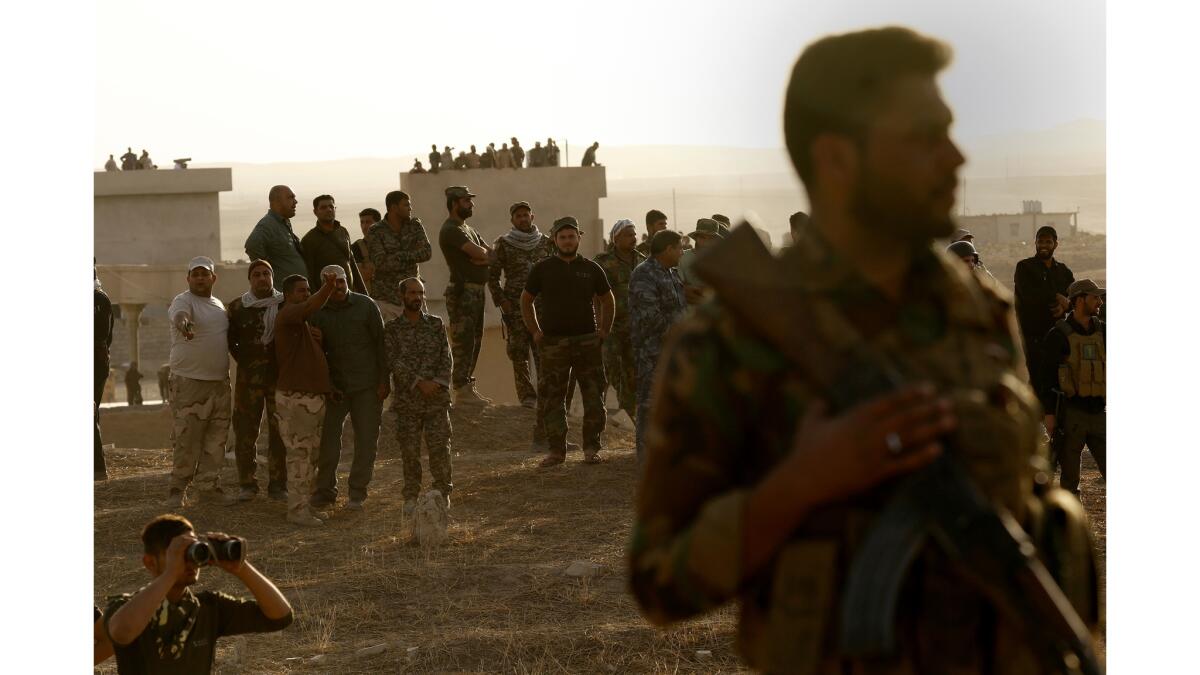
“They told us to come this far to Mosul and we stopped,” Ameri said, noting that they are working with the Iraqi army and Kurdish forces.
Since they joined the fight Saturday, two of their fighters have been killed by sniper fire, a few wounded. After the briefing, a suicide car bomb could be seen exploding nearby, and fighters said they stopped another, with no injuries to their forces.
Although the militias are made up primarily of Shiites, their ranks include Sunnis, Christians, Shabak, Yazidis and other religious minorities, said Ameri’s senior political advisor, Haitham Mayahi.
Mayahi said they have improved since past offensives.
“We as human beings learn from our mistakes,” he said, noting that the units have more training and better leadership than in previous battles. “They’re not going to have the same mistakes they had in Fallujah and other cities.”
The militias have also clashed with Kurdish forces in the past, in mixed areas such as the northern city of Tuz Khurmatu. The Kurds are a major component of the battle for Mosul, although they, too, have agreed not to enter the city.
Ameri said his group’s issues with Kurdish fighters “have been solved.”
Iraqi officials tried to keep the militias out of Sunni areas around Mosul that are historic sectarian flashpoints, Knights said. But Ameri wanted in on the high-profile offensive, putting Abadi and other leaders in a bind.
The militias gained support in recent years after routing Islamic state from Baghdad, Diyala and Samarra, Knights said.
In the Mosul offensive, Kurdish forces handled the initial assault to the north and east. Iraqi special forces took over as the fighting moved closer to the city center, also handling the southern flank. That left a gap in the vast desert southwest of the city. The Shiite militias agreed to secure it — with a catch.
They also wanted to fight for the city of Tall Afar, a strategic Islamic State stronghold between Mosul and Syria. The sectarian tinderbox of about 200,000, roughly 30 miles west of Mosul, was once home to Shiite and Sunni Turkmen. Turkish President Recep Tayyip Erdogan protested, calling it a Turkmen city and warning that the militias could terrorize it.

Speaking with Shiite fighters who are members of the Popular Mobilization Units. (Molly Hennessy-Fiske)
“The government and coalition had no good option for excluding them from the Tall Afar battle,” Knights said. “The final compromise is they get to do the Tall Afar battle, but they don’t get to do the city [Mosul] itself.”
But Ameri said his troops’ priority is Mosul, not Tall Afar.
“We are afraid that Mosul could be another Aleppo, but we hope that will not happen,” he said, referring to the Syrian city where government and allied Russian forces have been locked in a deadly standoff with rebels for months.
Ameri, a former transportation minister, appeared in fatigues on the front lines where his picture is plastered on checkpoints. He said that the militias’ goal is not just to free Mosul, but to “suffocate” Islamic State by cutting its supply route to the west to the Syrian stronghold of Raqqah.
Knights said there is a risk not only if Shiite militias enter Mosul, but if they crush and empty Tall Afar.
“What we don’t want is the people of Mosul looking to the west and seeing tons of people attacking [Tall Afar] and possibly killing large numbers and driving a large Sunni outflow … right back into the direction of Mosul,” he said.
Ameri raised another troubling possibility: If Islamic State fighters flee across the border into Syria, his forces are prepared to pursue them, which could further complicate the fight.
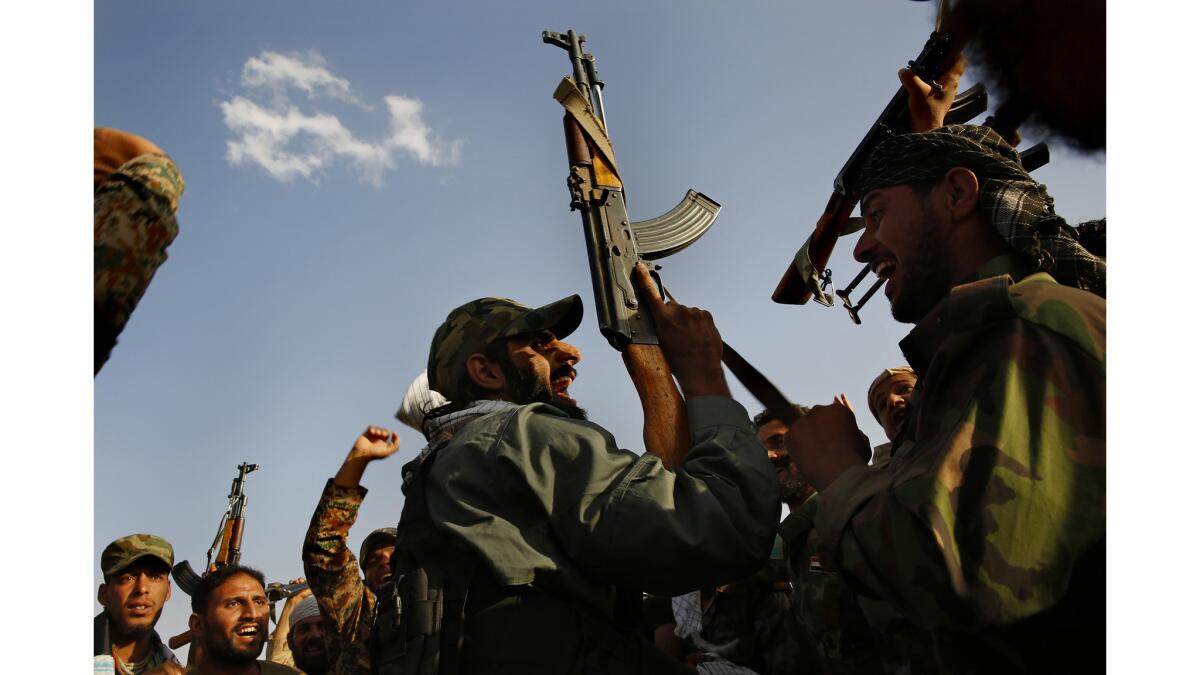
“If we have to, we will go to Syria,” he said, a position echoed by other Shiite militia leaders in recent days.
“Because we believe if Daesh is not finished in Syria, then they will be a real danger to Iraq,” he said, using the Arabic acronym for Islamic State.
Though Ameri and his circle are politically savvy and calculating, the leaders of smaller groups as well as the rank and file of his own organization lack his self restraint, said Patrick Martin, an Iraq analyst at the Institute for the Study of War in Washington, D.C.
“They say they are responsible to the prime minister, but that is not the case,” Martin said.
Their training is rudimentary, their loyalties divided among local leaders, their weaponry hodgepodge, he said. He warned that allowing the militias to participate in the offensive, particularly in Tall Afar, could undermine the ultimate goal: routing Islamist extremists.
“Just by being there and engaging in the things that they do — discriminate and engage in sectarian violence — it leaves the door open for ISIS or other groups to re-emerge,” he said.
Nor is it guaranteed that the militias will abide by their agreement to fight alongside Kurdish forces and not enter Mosul, he said. After the militias agreed not to enter Fallujah during the offensive there earlier this year, he said, “they walked right in.”
Kurdish forces have made a similar agreement not to enter Mosul.
Sitting outside the Zarqa command post fingering his prayer beads, a Shiite fighter named Abu Haider Tamimi said he joined Badr out of a sense of religious duty after a career in the Iraqi army.
When Sistani called on the faithful to unite against Islamic State two years ago, Tamimi, 62, figured Badr could use his expertise as a mine sweeping engineer.
He said he found and defused many mines in villages the group has freed so far. He’s willing to fight as long and far as it takes to help those suffering under Islamic State. But he insisted Badr will obey the prime minister and not overstep.
“It’s Abadi’s decision. If he tells us to stop, we will,” he said.
molly.hennessy-fiske@latimes.com
ALSO
Pentagon fears killing civilians from the air as battle for Mosul intensifies
In Syria’s capital, the civil war suddenly seems far away
More to Read
Sign up for Essential California
The most important California stories and recommendations in your inbox every morning.
You may occasionally receive promotional content from the Los Angeles Times.

